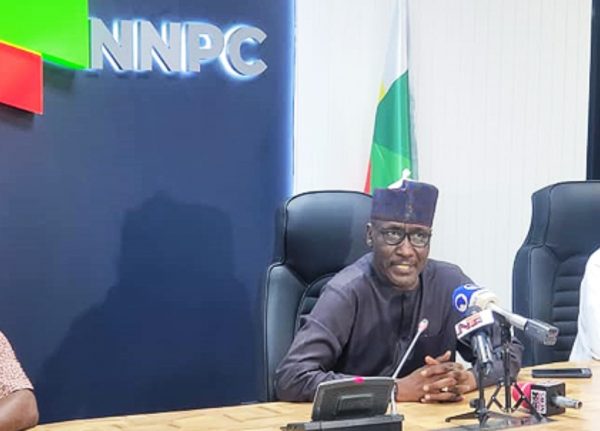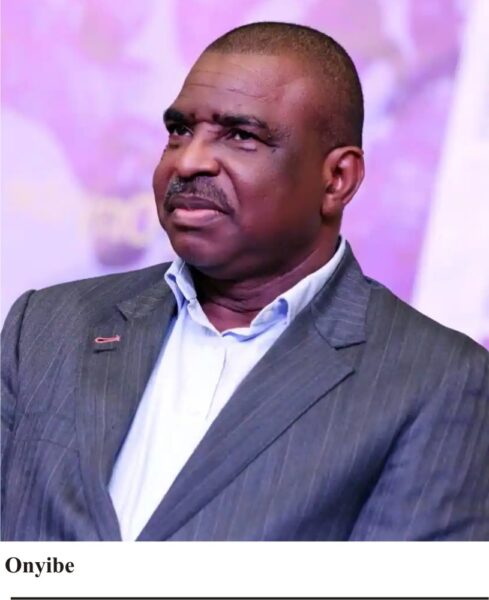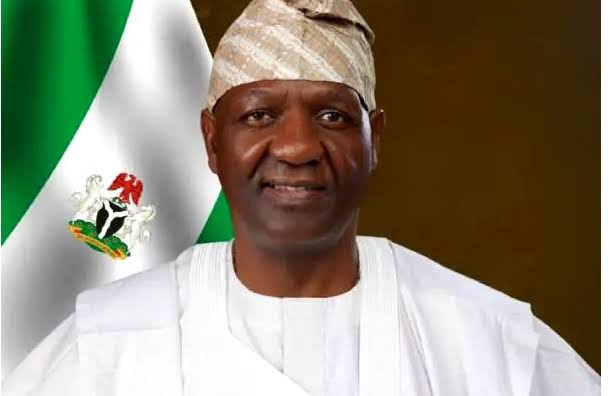Local Refining Won’t Crash Price Of Petrol —NNPC GCEO, Kyari

During his inauguration speech as the 16th President of Nigeria recently, President Bola Tinubu made the announcement of the removal of fuel subsidy.
The announcement triggered a chain of reaction which culminated in the increase of the pump price of Premium Motor Spirit (PMS) to about N500 and above.
In this interview on ARISE TV, the Group Chief Executive Officer of the Nigerian National Petroleum Company Limited, Mr. Mele Kyari disclosed that it is a misconception to think that refining domestically will crash the price of petrol in half, he reiterated the need for the removal.
He also dropped a bombshell that though there was an appropriation for the subsidy, in truth, there was no cash backing for the appropriation and that the FG could no longer foot the ballooning cost of the subsidy, the positive benefits that the country stands to derive from the removal, and so many other issues. EXCERPT.
Following The Announcement By President Bola Tinubu On The Removal Of Petrol Subsidy, The NNPC Limited Gave Its Support To The Move And Immediately Increased The Pump Price Of Petrol. What Is The Rationale For Such Move?
First of all, stock is different from pricing, you have to be sure that there is enough stock to guarantee supply. This is the provision of the law, that the Nigerian National Petroleum Company (NNPC) must guarantee energy supply.
Secondly, you must have a continuous supply, continuous supply comes from suppliers and those who make the product available for us. Whether it is locally refined or imported from other jurisdictions, you must pay for it because of the subsidy regime of 2021.
Recall that the Petroleum Industry Act (PIA) noted that subsidy regime will be terminated latest by 17th of February 2022. But the government decided that in the fiscal year 2022, a provision was made irrespective of the fact that the law said petroleum should be sold at the market price.
Again in 2023, up to half a year, the government still made another provision of subsidy to enable the continuous supply of petroleum at a subsidized rate. But the complication is this, you can make provisions in the budget, but you have to finance it. But the financing part of it is absent. I can tell you in 2022 when that provision was made, no single naira was paid to the NNPC Limited to provide those subsidies. A further implication of this is that the cash flow of NNPC was used to continuously supply petroleum to the country and it has become a daunting task almost impossible for NNPC to continue to bear this cost.
When we saw the alignment of government and the realities of the law that the government no longer has the ability to fund this, this means that the decision is eliminated by the law and also the realities that government doesn’t have the money to fund this, meaning, you are purchasing this product at a subsidized rate, yet you don’t have the money to pay, in essence, we will have to sell the product at the market rate so we can be able to continually supply the product into the market and avoid any potential default.
We are happy that this is happening now and it is not crystalizing anything. This is why NNPC saw the reality of this commodity and as soon as the indication was given, we knew that government cannot fund this and therefore we decided to adjust the price. It has nothing to do with anything rather we are just observing the rules of the game and the law of the federation.
Arguments Have Been Made That The Upward Adjustment Of The Price Was Hasty, Coupled With The Fact That Some Fuel Pumps Are Still In Possession Of The Old Stock, How Would You React To This?
This is typical anytime there is price adjustment to things, not just fuel. If you are in possession of the old stock, and there is a sudden increase in the price, you have to sell at the new price, otherwise two things will happen.
Firstly, you won’t be able to procure fuel at the new price, and incidentally, also it is impossible to take it back. This is the dynamics of the market and it is applicable to all products, not just petroleum. When people buy from us, oil marketers, and even our retailers, they do it at the market price and the market will adjust itself.
It’s not something that you say until my old stock is finished before I can buy the new price. It can be the other way round where the price will fall, meaning that those having the old stock will have to sell at the downward price to arrive at the market conditions.
So, it is really nothing strange, stock management issues are very typical and no one can do anything about it.
With The Removal Of Subsidies, Are We Now Going To Be Experiencing Only Upward Adjustments In Price Of PMS? If No, When Will Prices Begin To Moderate To A Lower Level?
The prices we are seeing today at the filling station are the current market price of the commodity. What this means is that prices in the market can go down at any time and the market will adjust itself. The beauty of this is that there will be new entrants, oil marketing companies are reluctant to come into the country because there is a subsidy regime in place.
And that subsidy regime doesn’t have the guarantee of repayment back to those who supplied the product at subsidized prices. Now that the market regulates it, oil companies can actually import product produced locally and can buy and take it to the market and sell it at commercial prices.
Therefore, you will see competition even with the NNPCL, and by law, NNPCL cannot do more than 30 percent of the market going forward. As soon as the market stabilizes, oil market companies can be able to come in, it means that even the requirement of energy security in the law is that you have to be able to have at least 30 percent stock in the country.
Competition will surely come in and definitely, the market will regulate the price. This is just an instantaneous price, and within one or two weeks, you will see an adjustment in price. This happens in many jurisdictions and countries. Companies have different approaches to it but ultimately, we will see changes in price downward. It is very likely because efficiency will come in.
Mind you, from the marketers to the fuel stations, including oil marketing company, everyone, is bound by the subsidy regime, but as soon as efficiency comes in, people will become more efficient in their depots, in managing their trucks, and staying in their fuel stations so that people will patronize them in their stations.
Where there is a difference of N3 naira, you see motorists move to where they will have the difference. But this will regulate the market, and on its own, it will come down naturally. This is not a fixed price, all we did is to see variable prices based on our cost on location, and by the realities around us knowing fully well that NNPC is the single supplier of the market today. It will be coming very quickly and there will be no monopoly.
At What Exchange Rate Does The NNPC Import Refined Fuel Into The Country? If There Are Going To Be More Players In The Market, Are The Players Going To Use The Parallel Market To Price What They Will Be Bringing To The Market To Factor How They Will Sell To The Country?
I am sure you must have heard what Mr. President said about exchange rate normalization, that will simply mean single exchange rate for everyone. The NNPCL uses the official exchange rate. This will now be the subject of stabilization created by the announcement of Mr. President. We see this coming very quickly, and once that happens everybody including the NNPC will accept Foreign Exchange (FX) at the same rate and when you have change of this nature, it is always a transition.
So, If We Move Toward Parallel Market, Doesn’t It Mean That The Fuel Prices Will Increase?
No, I don’t think so. What this situation will do is also regulate consumption when we have higher prices. This means that the volume of the product required will drop. And by estimate, about 30 percent of the volume of the product will move downward. As of today, there is no verifiable data to show fuel consumption in this country, but we know the evacuation from our depots, and that number will come down by at least 30 percent. And if that happens it also means that collateral decrease in the requirement of FX in the market. Therefore, the same source of FX that NNPC have access into the market, all the market will have same access. I know and I am aware that engagement in the FX single window. I don’t see any FX impact on the price of PMS.
Can You Take Us Through The Computational Forces That Informed The Market Price?
Firstly, the price of PMS is an international price, the import price is not secret, and secondly along the ballot chain we have a number of indices, the cost of ship-to-ship transfers, cost of hoarding this product in the depots, cost of managing trucks from the depot all the way to filling stations, cost of also managing the product at the filling station. Also, several other margins, from the marketers to the depot owners which has to be factored. There are numbers around it and I can’t recollect now, but I know that we considered all this before arriving at the prices you see now.
Why Did NNPC Not Wait Till The End Of June Or First Week Of July To Increase PMS Price, Despite The Former Finance Minister Announcing That Payment Has Been Made Up To June 30th?
Actually, you can make a budget, there was provision of N6trn in 2022, and N3.7trn for half of 2023, and I can tell you that not a single naira has been funded. And by law, we are required to pay taxes, entities as a company. These are fiscal obligations before we declare profit to our shareholders. I am sure you are aware that this company is doing well, we have grown up to N607bn profit in 2021. This is huge but you can’t make that dividend available to the shareholders because of the burden in the volume of subsidy and that volume of subsidy must be financed. The provision in the law simply means that the government will write a cheque to NNPC at the end of the month for the service we are providing to the nation. That cheque has not been written. And what we did is that we held back the fiscal obligations, despite the fact that we are holding the financial obligation of 2022 and half 2023, there is still a net deficit of N2trn the president should have written a cheque for us. Yes, there is a provision, but you do not have the cash to back it up and the fiscal obligation that comes with it.
You cannot give what you do not have. It all comes down to the NNPC to settle for it. Petroleum supply is a ticking clock that doesn’t stop, the moment you stop, the energy system of the country will stop. So, we won’t wait because if we continue like this, it will get to a difficult stage where we will not be able to supply. Even when we produce locally, be it Dangote refinery or our refinery, there will still be a default. The key issue around this is that this country no longer has the finance to back this up. You might have the number in appropriation, but we don’t have the cash in our hands.
Some People Say Subsidy Removal Will Benefit The Common Man, But There Is A Hike In Transportation While Others Say It Will Benefit The Rich, Where Do You Stand In This Debate?
When we say it will benefit the rich, our statistics over time on the volume of products that go out, you see that the huge volumes go to locations where you have a higher standard of living. Almost 48 percent of the total evacuation goes to a few locations essentially where the elite lives. That means all of us are subsidizing for that group of people and it’s very reflective. If you come to Abuja, you see a convoy of cars, politicians, government leaders, and business leaders, with five to six cars consuming over 100 liters of fuel.
We are actually subsidizing these people. For the common man, the value of subsidy goes to the elites and the pains of the removal come to do. However, the market will regulate the cost of transportation, people will have no choice but to allow their vehicles to come with passengers, and realities will dawn on our transportation sectors to fall prices of transport. There will be a pain for the common man, but the alternative to subsidy is better. For us to keep the subsidy is abandoning many things that need attention. There are engagements going on with our stakeholders to see what the government can do for its citizen. The disposition of Mr. President is very clear, people are sensitive, make sure the common man doesn’t suffer, make PMS available and accessible so that there will be greater expansion, more people back to work, people can access resources of the state and ultimately there is prosperity around the country. This is credible, but for us to do this, we must have to face the functional situation of the market. And the market situation cannot be afforded. And a number of steps are been taken and I know that things are concurrently happening.
Does This Mean That Market Regulation Will Eliminate Smuggling And Will We Be Able To Have Accurate Data Of Fuel Consumed In The Country Moving Forward?
Absolutely, the market will control volumes today, not NNPC, not the regulator. The volume of consumption will be controlled by the market, and there will be more credible data that will be very explainable. There will be no arbitrage around it for you to take control, the numbers will become real, secure, and absolute data. But first technology can come to play by bringing the right data going forward. So, I know a number of steps are taken by the FG to bring the right data up to the fuel station level. So, data will be available. Cross-border smuggling when you have an arbitrage regime, the same thing happens with cocaine. But this will crash drastically because what the data is doing, is providing FX to neighbors as well as subsidy. All these will stop and those volume used will be determined by the market. Also, we are expanding our market, this is going to the countries around us, it will now become a trade rather than smuggling.
What Is The State Of Our Refineries, How Will The Dangote Refinery Buffers As Regard To Its Output Capacity To What Is Needed And Data Of What Is Evacuated From Your Stock On A Daily Basis?
There is a misconception that once you refine domestically the price will crash to half, the distinction between domestic refining and import is on two basics. One, it gives the security of supply as it doesn’t need fourteen days to move from Europe to Nigeria, supply is at your pace. And once there is dislocation, it requires a short time to fix and move around.
Secondly, it creates a market around it, employment, taxes, to the country. Now when it comes to the prices themselves, remember that PMS is priced at the international market, it doesn’t have a local price. This means the conversion by FX is based on the international market.
But there will be a delta, that delta is the cost of freight from the point of import to the country which will substantially come down, as a result of the freight difference which is around N25 to N27 from Europe to Nigeria and also, some value in local refining, and ultimately at high prices, the distinction is there but not significant.
Going forward with our own refineries, the Port Harcourt refinery was delayed, these delays were caused by global supply issues, not distinct to us, but we are working on it, and we supply this by the end of the year. Warri refinery is ready in earnest, and Kaduna refinery the contract has been awarded and it also ongoing. Ultimately the end result is that there will be surplus of production in the country by the end of next year. And the Dangote refinery which will supply by August this year.
Once that happens, there will be significant supply in the volume, but not all the needed volume. There are also other refineries coming up. Once this happens, this country will be the home of PMS and other product. It will also be the supplier to the West African region and other region and there will be a reversal to the market, this will happen. Will it be crystallized tomorrow, the answer is no, we regret this, but we know that we will overcome it.
Will This Removal Of Subsidy Stop NNPC From Being The Sole Supplier Of PMS, Despite Its Role As The Sole Supplier Over The Years And How Will Other Marketers Operate In This New Dispensation Of No Subsidy?
I earlier said that NNPC by law cannot have more than 30 per cent stock. So, the removal of subsidy means that there will not be monopoly in the market and people can access FX freely. Private sectors will also come in, it can kick in tomorrow or anytime because there will be transition which is bound to happen.
What is the timeline to queues disappearing, and your final words to Nigerians?
The queues are there because of panic, inventory management, oil marketing companies, they know that they have to go back. So, it’s typical. It will not last for two to three days. And naturally because it is upward increase in price, people will stop taking more than what they need. And the queues will naturally dissipate, because it is price determine







